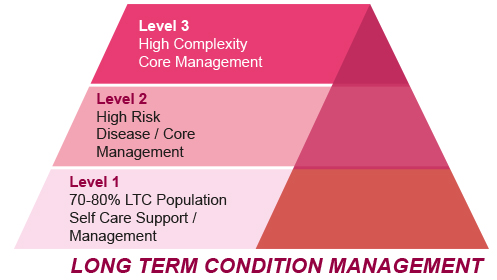Supporting self management is recognised as being a core part of high quality care for people living with LTCs. Far from leaving the individual with a sense of being abandoned, supported self management empowers people to harness their knowledge, skills and resilience, and seek access to care and support which addresses their own specific needs (Taylor et al, 2014). Although health care professionals play an important role in the enhancement of self management skills, it is the individual’s access to social support which often ensures changes are implemented and sustained. Self management requires the establishment of a partnership which empowers the individual through the development of key skills and understanding. Self management is multifaceted involving physical, psychological and social care. It is estimated that approximately 70-80% of patients with LTCs are able to self care with support (Department of Health, 2005) (Figure 2). The most frequently implemented aspects of self management support are related to education and psychological care (Taylor et al, 2014).

Page last reviewed: 25 Sep 2020


